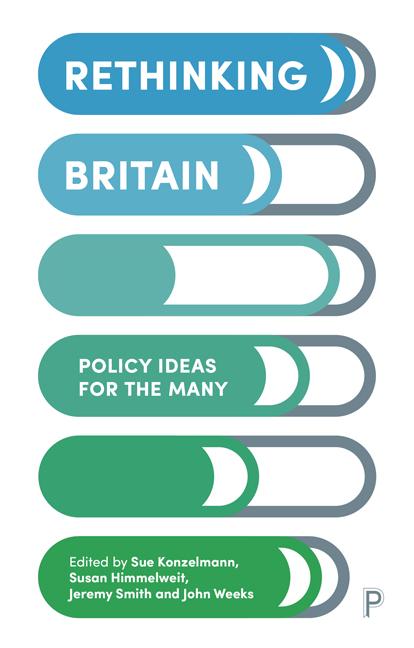Book contents
- Frontmatter
- Contents
- List of Tables and Figures
- The Contributors
- Foreword
- Introduction
- Interlude: ‘Mirror, Mirror, On the Wall – Who has the Highest Debt of All?’
- Part One Building a Full-Employment Economy: Introduction
- Part Two Public Investment – Prioritising Society Rather than Profit: Introduction
- Part Three Making Finance Work for Society: Introduction
- Part Four Genuine Social Security: Introduction
- Part Five How to provide for Social Needs: Introduction
- Conclusion
- Jargon Busters
- References and Further Reading
- Index
Foreword
Published online by Cambridge University Press: 11 March 2021
- Frontmatter
- Contents
- List of Tables and Figures
- The Contributors
- Foreword
- Introduction
- Interlude: ‘Mirror, Mirror, On the Wall – Who has the Highest Debt of All?’
- Part One Building a Full-Employment Economy: Introduction
- Part Two Public Investment – Prioritising Society Rather than Profit: Introduction
- Part Three Making Finance Work for Society: Introduction
- Part Four Genuine Social Security: Introduction
- Part Five How to provide for Social Needs: Introduction
- Conclusion
- Jargon Busters
- References and Further Reading
- Index
Summary
As the founder and Chair of the Progressive Economy Forum, I am delighted to support the launch of this excellent book.
Rethinking Britain is a collection of essays designed to cover major policy ideas for a complete redesign of the UK economy. Goodness knows that such a project is needed.
The UK has been subject to a disastrous economic experiment since the election of the Thatcher government in 1979. The ‘neoliberal’ agenda involved privatisation of state assets, restricting trade union powers, abolition of capital controls, reducing tax on high earners and deregulation to set business free from the alleged constraints of red tape.
Our manufacturing industry shrank and many areas became economically depressed as factories closed. They have remained that way in the absence of any proper regional or industrial policy. The economy became more focused on services, especially financial services.
Growth in the economy never matched up to that achieved in the ‘Golden Age of Economics’ from 1950 to 1975. There were periods of mass unemployment and volatility. Inequality increased. The de-regulated financial sector expanded and drove a huge increase in debt and mortgages which led directly to the 2008 crash.
Post-crash our public debt and deficit rose as GDP fell by 6%, government tax receipts dried up and spending on benefits rose as unemployment increased. A Keynesian-inspired stimulus package in 2009 enabled a recovery to start but this was halted in 2010 by the Conservative-led coalition government. Their remedy of austerity to reduce public debt by cuts in public spending has predictably resulted in the slowest recovery from recession since records began.
Public debt as a percentage of GDP is now higher in 2019 than it was in 2010. Real wages have incredibly still not recovered to pre-crash levels. Child poverty and homelessness have rocketed. The resulting unhappiness and financial insecurity of many citizens led to the Brexit vote which has paralysed our politics for three years and if implemented will make things still worse.
The neoliberal experiment has had its day and has failed to bring prosperity and stability. However, it will only end with the election of a progressive government dedicated to ending austerity and implementing sustainable policies to rebuild the economy.
- Type
- Chapter
- Information
- Rethinking BritainPolicy Ideas for the Many, pp. xv - xviiiPublisher: Bristol University PressPrint publication year: 2019



